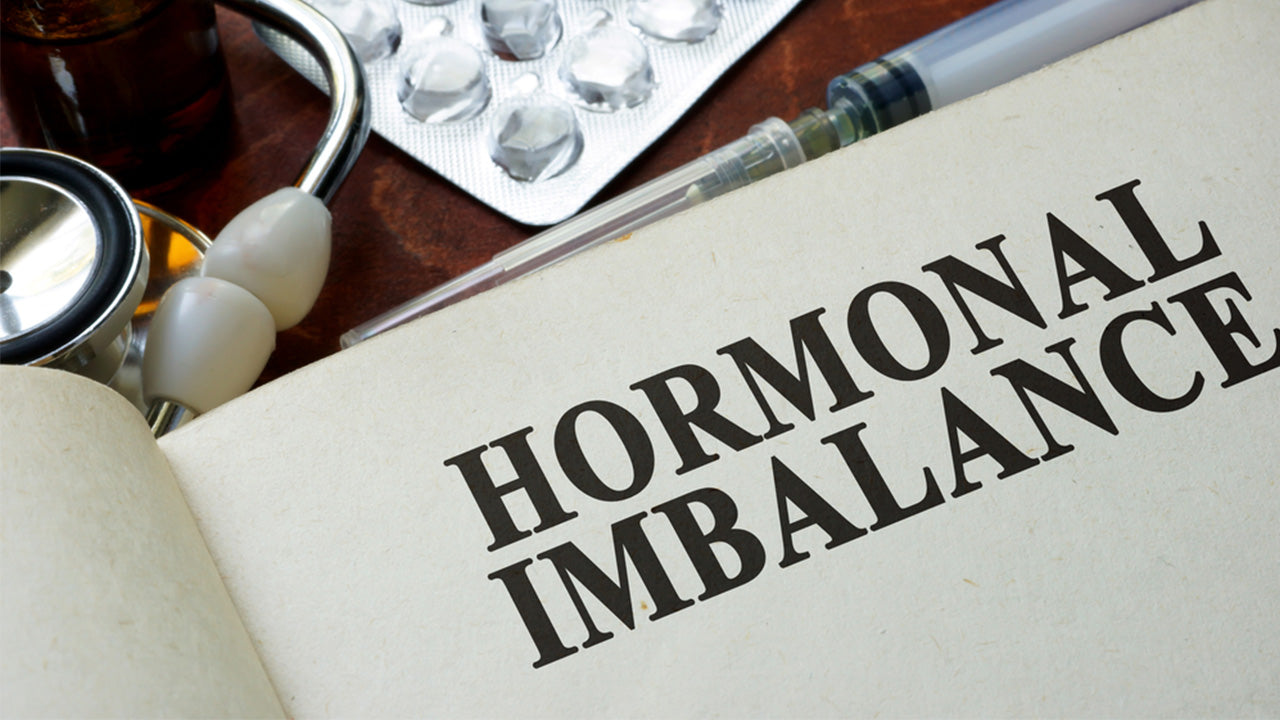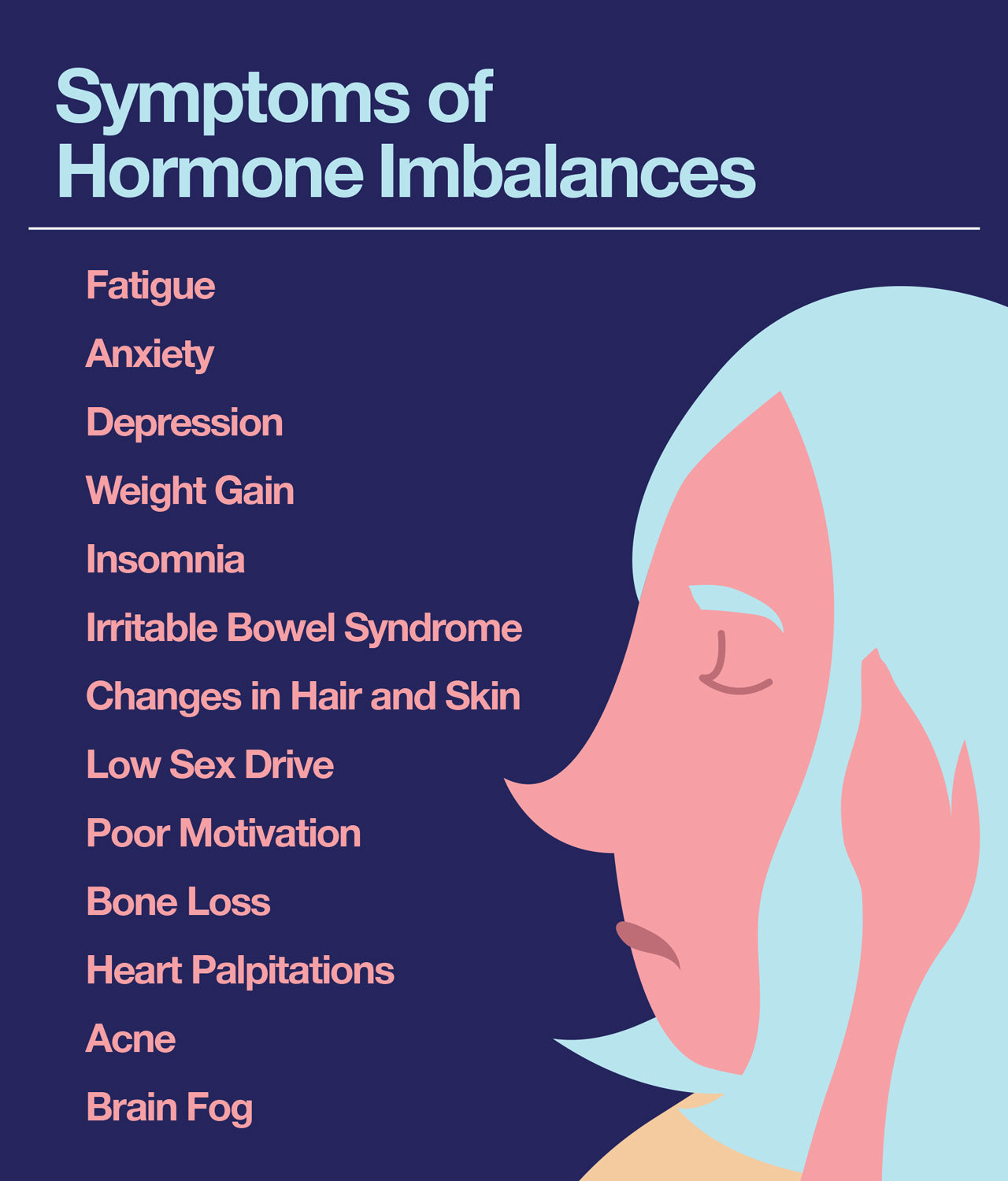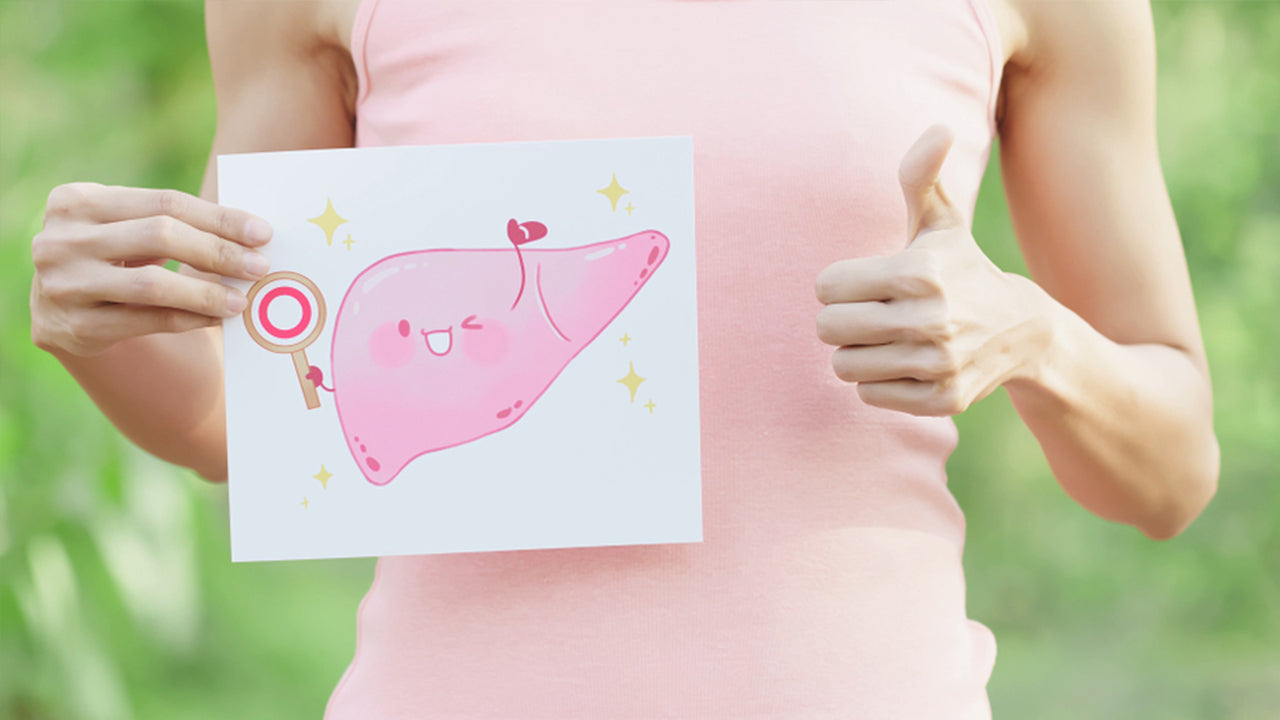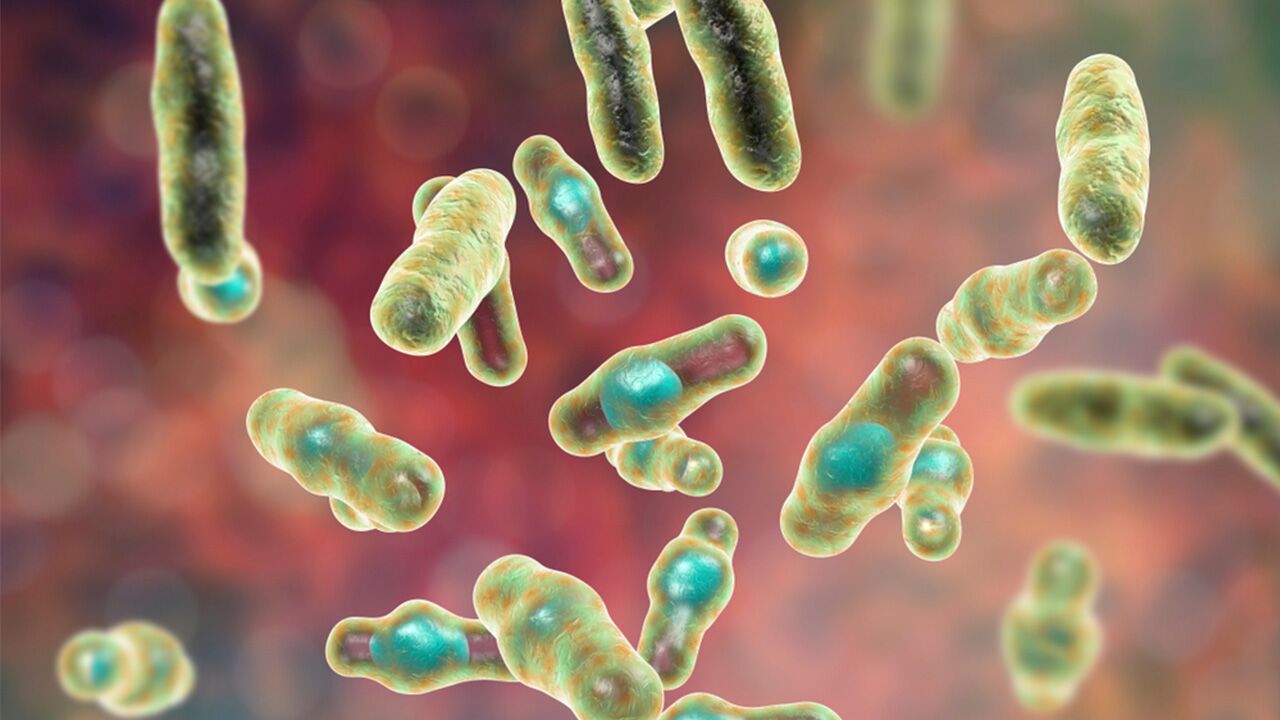7 Hormone Imbalance Treatments and 13 Symptoms of Hormonal Imbalances
 By: by Amino Science
By: by Amino Science

Hormone imbalances can occur at any age, and left untreated imbalances may cause potentially serious health consequences. Effective hormone imbalance treatments are available, and natural remedies may help to get your body back to producing hormones optimally.
What Are Hormones?
Hormones are the chemical messengers produced and secreted through the glands in the endocrine system. Hormones travel through the bloodstream to various tissue and organs, providing detailed operating instructions and critical information to your overall health and well-being. Hormones are responsible for regulating:
- Respiration
- Metabolism
- Reproductive cycles
- Sensory perception
- Movement
- Sexual development
- Growth
- Bone health
- Mood
- Sleep cycle
- Body temperature
- Sexual function
13 Symptoms of Hormone Imbalances
Hormone imbalance can manifest in a variety of ways. Watch for the following red flags.
1. Fatigue
Chronic fatigue that you just cannot shake may be a result of an adrenal disorder, hypothyroidism, diabetes, or hypogonadism.
2. Anxiety
When the body releases too much cortisol and norepinephrine, anxiety symptoms can develop. This imbalance of stress hormones can be caused by disorders of the adrenal gland, thyroid gland, or the pituitary glands.
3. Depression
Depression is associated with thyroid disease, menopause, hypogonadism, and obesity.
4. Weight Gain
Weight gain is a byproduct of an overproduction of cortisol. Cortisol tells the human body to hang on to fat as an emergency source for energy.
5. Insomnia
Persistent insomnia is often a sign of a melatonin imbalance, hypothyroidism, hyperthyroidism, and diabetes.
6. Irritable Bowel Syndrome
The gut and the endocrine system are synergistic. Irregularities in the stomach can cause hormone imbalances, and hormone imbalances can cause irritable bowel syndrome symptoms.
7. Changes in Hair and Skin
Hair loss, thinning hair, brittle nails, and dry skin can all be signs of menopause, hypogonadism, hypothyroidism, diabetes, and polycystic ovary syndrome.
8. Low Sex Drive
In both men and women, low sex drive is associated with an imbalance in estrogen, progesterone, DHEA, or testosterone that can be associated with polycystic ovary syndrome, hypogonadism, menopause, thyroid disorders, and disorders of the pituitary glands.
9. Poor Motivation
Yes, a lack of motivation (and chronic procrastination!) is a sign of a hormone imbalance. It’s specifically a sign that your body isn’t making enough dopamine.
10. Bone Loss
Osteoporosis occurs when bone tissue is broken down faster than new bone tissue is created. Menopause, pituitary gland disorders, hyperparathyroidism, diabetes, anorexia, rheumatoid arthritis, and hypercortisolism can all cause hormone disruptions that lead to bone loss according to the Hormone Health Network of the Endocrine Society.
11. Heart Palpitations
According to Johns Hopkins Medicine, heart palpitations can be caused by stress, menopause, pregnancy, menstruation, and thyroid disorders.
12. Acne
Acne is associated with hormone fluctuations during puberty, menstruation, menopause, polycystic ovary syndrome, and androgen hormone imbalances.
13. Brain Fog
Cloudy thinking, or brain fog, is most often linked to menopause and thyroid disorders. But brain fog can also be a symptom of pregnancy and adrenal disorders.

Causes of Hormone Imbalances
There are hundreds of hormones coursing through the human body at any given moment. To understand and effectively treat a hormone imbalance, you must identify the root cause. A hormonal imbalance test can help you and your doctor determine the best treatment protocol, as well as natural treatments and lifestyle changes that may help improve hormone levels in your body.
Potential causes of hormonal imbalances include:
| Chronic stress | Excessive alcohol consumption |
| Poor diet | Sedentary lifestyle |
| Menopause | Pregnancy |
| Menstrual cycles | Exposure to toxins and endocrine disruptors |
| Hashimoto’s disease | Hypothyroidism |
| Hyperthyroidism | Grave’s disease |
| Thyroid nodules | Adrenal disorders |
| Pituitary disorders | Diabetes |
| Hyperglycemia | Hypoglycemia |
| Obesity | Hormone replacement therapy |
| Birth control pills | Cushing’s syndrome |
| Addison’s disease | Chronic or acute infections |
| Cancers affecting endocrine glands | Chemotherapy and radiation |
| Goiters | Pancreatitis |
| Anorexia nervosa | Hypogonadism |
| Prostate Cancer | Phytoestrogens |
| Polycystic ovary syndrome | |
Hormone Imbalance Treatments
There are so many disorders, conditions, and lifestyle choices that can cause hormone imbalances. It is essential to speak to your doctor about the root cause of your symptoms so that an effective treatment program can begin. Complementary therapies may help balance your hormone levels naturally—but speak to your doctor before trying any of the suggestions below, especially if you are on any hormone replacement therapy or protocol.
Hypothyroidism
Here are seven natural hormone imbalance treatments based on specific underlying disorders and diseases.
Ashwagandha
A daily regimen of 600 milligrams of ashwagandha root extract for eight weeks significantly improved TSH, T3, and T4 levels in patients with “subclinical” hypothyroidism according to a recent study published in the Journal of Alternative and Complementary Medicine.
L-tyrosine
The amino acid L-tyrosine taken at a dose of between 500 milligrams and 1000 milligrams each day may help improve the production of thyroid hormones, memory, stress, and sleep. However, L-tyrosine supplements can adversely interact with medications, including those prescribed for hypothyroidism and Hashimoto’s disease, so talk to your doctor before taking tyrosine.
Hashimoto’s disease
Vitamin D
A daily vitamin D supplement of 3000 IU to 6000 IU, plus 10-15 minutes of direct sunshine a day, may benefit thyroid disease and may reduce the risk of developing autoimmune thyroid disease and thyroid cancer. Vitamin D deficiency is associated with an increased risk of Hashimoto’s thyroiditis according to researchers.
In an interesting study on overweight postmenopausal women, vitamin D supplements supported weight loss, but more importantly researchers found a link between vitamin D and sex hormones related to breast cancer. Researchers from the Fred Hutchinson Cancer Research Center note that further studies are warranted to understand the preventative role vitamin D may play in postmenopausal breast cancer.
Hyperthyroidism
L-carnitine
A 500-milligram dose of the amino acid L-carnitine taken four times a day may reduce symptoms of overactive thyroid, including heart palpitations, tremors, insomnia, and nervousness according to the University of Maryland Medical Center. Typical doses of this amino acid range between 1 gram to 3 grams daily. However, talk to your doctor before you begin taking an L-carnitine supplement if you have hyperthyroidism or Graves disease.
Read this article to learn about the best way to supplement with carnitine.
Irritable Bowel Syndrome
Probiotics
Fifty billion CFU of probiotics a day may help increase the level of healthy bacteria in the gut. Research shows that probiotics play a therapeutic role in relieving inflammation in the gut and may help to reduce the severity of IBS symptoms.
Tryptophan
The essential amino acid tryptophan in doses between 1000 milligrams and 1500 milligrams may help aid digestion and support the brain-gut axis. Tryptophan is the precursor for serotonin, a primary chemical associated with digestion, and it may also help relieve other hormone imbalance symptoms including:
- Insomnia
- Irritability
- Chronic stress
- Mania
- Obesity
Check out this article to learn more about how tryptophan can affect your energy and mood.
Osteoporosis
Amino Acids
According to a study published in the Journal of Bone and Mineral Research, amino acid intake is directly linked to bone health and the prevalence of osteoporosis and osteopenia. The researchers of this cross-sectional study identified alanine, arginine, glutamic acid, leucine, lysine, and proline as “bone-protective amino acids” and revealed that consuming more of these amino acids is beneficial in the fight against osteoporosis.
They maintain: “These data provide evidence to suggest that intake of protein and several amino acids, including alanine and glycine, may be beneficial for bone health.”
It’s always best to take a balanced blend of essential amino acids to keep the concentration of amino acids in the blood stable and to optimize energy, mood, and protein synthesis. Shop our product line for help with balancing hormones and strengthening bone health.
Reduce Toxin Exposure
Endocrine disruptors interfere with the body’s endocrine system according to the National Institute of Environmental Health Sciences. Endocrine disruptors include natural and man-made compounds, such as pesticides, dioxin, flame retardants, and more. Continued exposure to these types of toxins is linked to hormone disruption, immune system effects, reproductive problems, and neurological symptoms.
Reduce your exposure to toxins by:
- Avoiding pesticides, herbicides, and insecticides.
- Avoiding household cleaning products with chlorine or bleach.
- Avoiding plastic containers, bags, plates, bottles, and cups.
- Reducing or eliminating solvents in beauty products like nail polish and nail polish remover.
- Eating hormone-free meat and dairy.
- Eating wild-caught fish instead of farmed fish.
- Switching to organic tampons and sanitary napkins or using a menstrual cup.
Risks of Hormonal Imbalances
If you don’t treat hormone imbalances properly, the results can be devastating to your physical health and emotional well-being. Recognized risks of prolonged hormone imbalances include:
- Osteoporosis
- Type 2 diabetes
- Obesity
- Depression
- Chronic fatigue
- Increased risk of hormone-related cancers, including breast cancer, ovarian cancer, prostate cancer, and uterine or endometrial cancer.

Up to 25% off Amino
Shop NowTAGS: conditions natural cures
Join the Community
Comments (0)
Most Craveable Recipes




 833-264-6620
833-264-6620




















